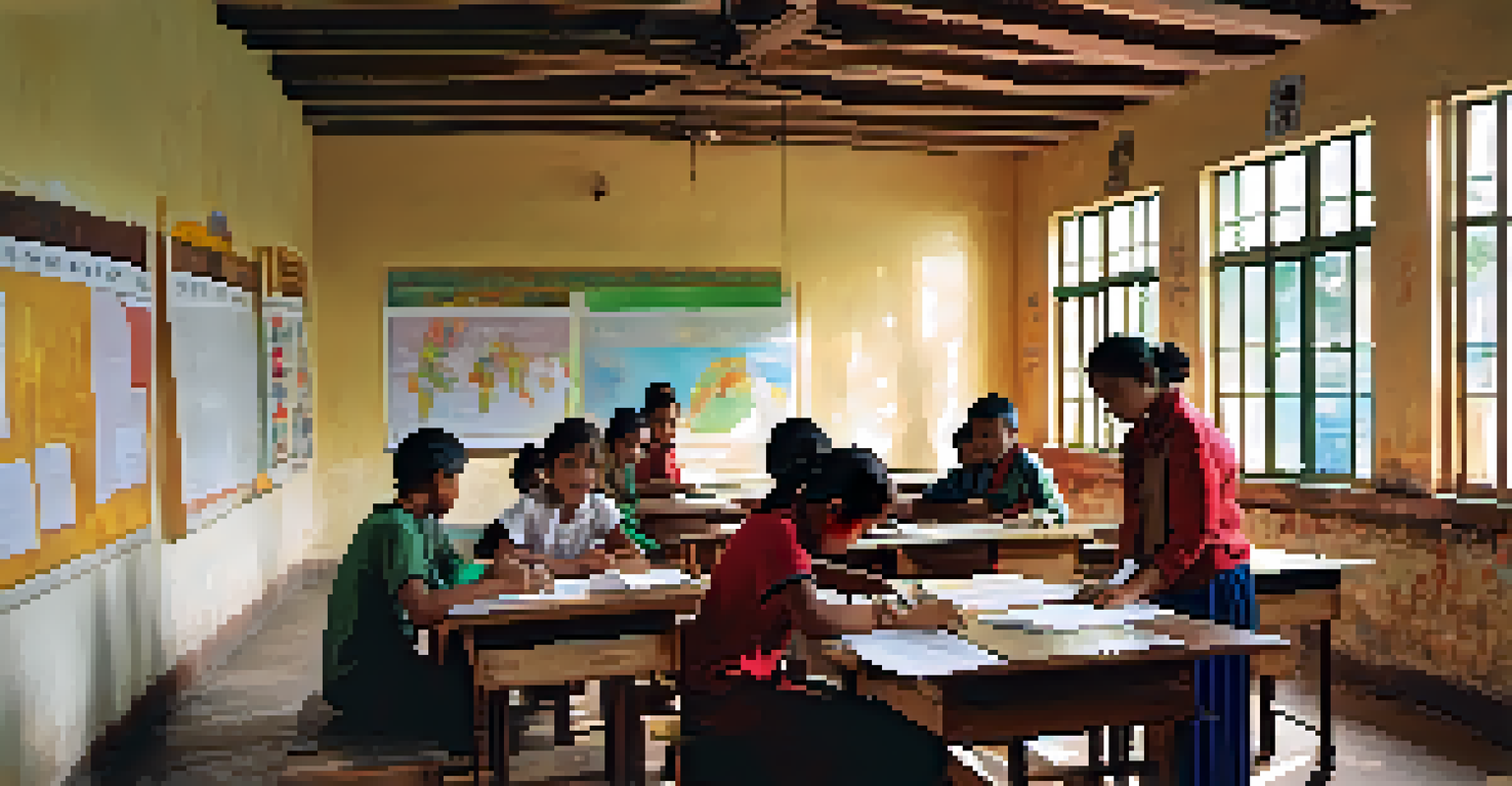The Role of Volunteer Travel in Community Development

Understanding Volunteer Travel and Its Purpose
Volunteer travel, often referred to as 'voluntourism,' combines travel with community service. Travelers engage in projects that benefit local communities, ranging from education to environmental conservation. This approach not only enriches the volunteer's experience but also addresses specific needs within the community.
The best way to find yourself is to lose yourself in the service of others.
The essence of volunteer travel is rooted in the idea of giving back while exploring new cultures. Participants immerse themselves in the local way of life, gaining a deeper understanding of the community's challenges and successes. This personal connection can lead to meaningful, long-lasting relationships between volunteers and local residents.
Ultimately, the purpose of volunteer travel goes beyond just a vacation; it aims to create a positive impact. Whether it’s through rebuilding infrastructure or teaching skills, each contribution plays a vital role in fostering community growth.
Economic Benefits of Volunteer Travel for Communities
One of the most immediate benefits of volunteer travel is the economic boost it provides to local communities. Volunteers often stay in local accommodations, eat at local restaurants, and buy crafts from local artisans, stimulating the economy. This influx of funds helps support small businesses and creates jobs.

Moreover, many volunteer projects focus on sustainable practices that can lead to long-term economic growth. For example, projects that promote eco-tourism can enhance a community's appeal to visitors, creating new revenue streams. This transformation can be pivotal in areas where traditional industries may be fading.
Volunteer Travel Boosts Local Economies
Volunteer travel stimulates local economies by supporting small businesses through accommodations, dining, and shopping.
In essence, volunteer travel serves as a catalyst for economic development, providing resources and opportunities that might otherwise be unavailable. By investing in the community, volunteers help lay the foundation for a more prosperous future.
Social Impact: Building Connections and Understanding
Volunteer travel fosters social connections between volunteers and community members. These interactions can break down cultural barriers and promote mutual understanding, which is essential in today’s globalized world. When volunteers share their skills, they also share stories and experiences that enrich both parties.
Volunteers do not necessarily have the time; they just have the heart.
Additionally, the presence of volunteers can help raise awareness of social issues within the community. Their commitment to service often inspires locals to take action, creating a ripple effect of positive change. This sense of camaraderie can strengthen community bonds and foster a spirit of collaboration.
Ultimately, the social impact of volunteer travel is profound. By bridging cultural divides and promoting empathy, it encourages communities to unite in addressing their challenges collectively.
Environmental Stewardship Through Volunteer Initiatives
Many volunteer travel projects focus specifically on environmental conservation, which is crucial in our rapidly changing world. Volunteers often participate in activities like tree planting, wildlife protection, and beach clean-ups. These efforts not only improve the local ecosystem but also educate participants on environmental issues.
Moreover, engaging in environmental projects helps communities develop sustainable practices that can protect their natural resources. Volunteers often bring new ideas and techniques that can help locals manage their environment more effectively. This collaboration can lead to innovative solutions tailored to the community's unique challenges.
Fosters Cultural Connections
Volunteer travel helps build meaningful relationships and understanding between volunteers and community members.
In this way, volunteer travel serves as a powerful tool for environmental stewardship. By actively participating in conservation efforts, volunteers contribute to a healthier planet while empowering communities to take charge of their ecological future.
Education and Skill Development for Communities
A significant component of volunteer travel is the focus on education and skill development. Volunteers often contribute to teaching English, vocational skills, or health education, all of which can have a lasting impact. This transfer of knowledge equips community members with tools for personal and professional growth.
Furthermore, volunteers themselves benefit from this exchange by gaining new perspectives and skills. Many leave with a broader understanding of global issues, which can inspire them to make a difference in their own communities upon returning home. This mutual growth creates a cycle of learning that transcends borders.
In essence, the educational aspect of volunteer travel enriches both volunteers and community members. It fosters an environment of continuous learning, which is essential for sustainable community development.
Challenges and Ethical Considerations in Volunteer Travel
While volunteer travel has numerous benefits, it's essential to acknowledge the challenges and ethical considerations involved. Some programs may unintentionally create dependency rather than fostering independence. Volunteers must be mindful of how their presence can affect local dynamics and strive to empower rather than impose solutions.
Additionally, it's crucial for volunteers to choose reputable organizations that prioritize ethical practices. Researching and understanding the community's needs is vital to ensure that the assistance provided is both relevant and respectful. This thoughtful approach minimizes the risk of 'voluntourism' becoming a form of neo-colonialism.
Promotes Environmental Stewardship
Many volunteer initiatives focus on environmental conservation, empowering communities to protect their natural resources.
By addressing these challenges, volunteers can ensure their efforts contribute positively to community development. Ethical volunteering is a journey of humility, learning, and collaboration that benefits everyone involved.
The Future of Volunteer Travel and Community Development
As the world continues to change, the future of volunteer travel is evolving. Increasingly, volunteers are seeking meaningful experiences that prioritize social and environmental impact. This shift encourages organizations to develop programs that align with sustainable development goals, ensuring their work remains relevant.
Moreover, technology plays a significant role in shaping the future of volunteer travel. Online platforms now connect volunteers with communities in need, making it easier than ever to find opportunities that match their skills and interests. This accessibility expands the reach of volunteer initiatives, allowing more people to contribute to meaningful causes.

Looking forward, the potential for volunteer travel to drive community development remains immense. As more individuals recognize the power of their contributions, the ripple effect of positive change can lead to a brighter future for communities around the world.